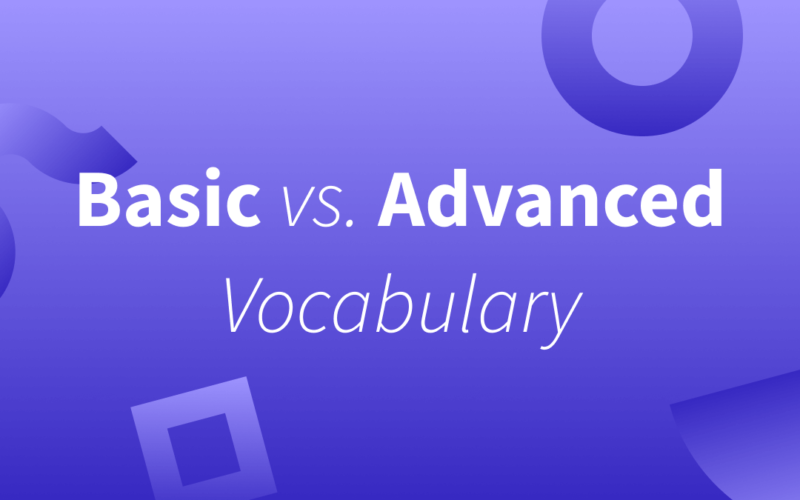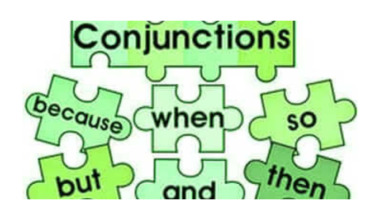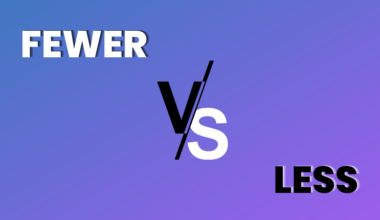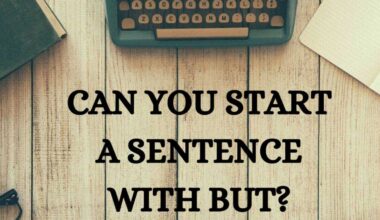When it comes to mastering English, there’s a clear difference between using basic vocabulary and tapping into more advanced language. Basic English words and phrases are essential for beginners, offering simple, easy-to-understand language.
However, as you progress, advanced English vocabulary and structures can make your communication more precise, expressive, and sophisticated.
This blog post will explore these differences, offer practical examples, and provide a comprehensive list of 40 basic words with their advanced counterparts.
40 Basic vs Advanced English Examples
Below, you’ll find a list of basic English words paired with their advanced alternatives. These substitutions can make your writing or speaking sound more polished, especially in professional or formal contexts.
| BasicEnglish | Advanced English |
| Help | Assist |
| Start | Commence |
| End | Conclude |
| Buy | Purchase |
| Think | Contemplate |
| Choose | Select |
| Keep | Retain |
| Get | Obtain |
| Tell | Inform |
| Ask | Inquire |
| Use | Utilise |
| Show | Demonstrate |
| Make | Manufacture |
| Want | Desire |
| Work | Operate |
| Find | Discover |
| Go | Depart |
| Say | Declare |
| Need | Require |
| Give | Provide |
| Leave | Vacate |
| Bring | Transport |
| Stop | Cease |
| Fix | Repair |
| Agree | Concur |
| Check | Verify |
| Look | Gaze |
| Start again | Resume |
| Teach | Instruct |
| Help | Facilitate |
| Call | Summon |
| Eat | Consume |
| Build | Construct |
| Explain | Elucidate |
| Show | Exhibit |
| Rise | Ascend |
| Go up | Increase |
| Understand | Comprehend |
| Answer | Respond |
| Improve | Enhance |
Enhancing Communication with Advanced Vocabulary
Using advanced vocabulary isn’t just about sounding more formal; it adds depth and specificity to your language.
Advanced words often carry subtle nuances that basic words can’t express. Let’s break down a few of these basic-to-advanced substitutions with practical examples and scenarios to illustrate their impact.
1. Help vs. Assist
- Basic: Can you help me with my homework?
- Advanced: Could you assist me with my assignment?
In both sentences, the person needs help with a task. However, “assist” sounds more polite and formal, making it ideal for professional or academic contexts.
2. Start vs. Commence
- Basic: Let’s start the meeting.
- Advanced: Let’s commence the meeting.
“Commence” is an advanced term often used in business and formal events, suggesting a sense of order and structure that “start” doesn’t always convey.
3. Think vs. Contemplate
- Basic: I think I’ll go on a trip.
- Advanced: I’m contemplating going on a journey.
Using “contemplate” instead of “think” gives the impression of deeper, more thoughtful consideration, which is especially useful when discussing plans or decisions.
4. Buy vs. Purchase
- Basic: I need to buy a new phone.
- Advanced: I need to purchase a new mobile device.
“Purchase” often appears in sales, contracts, or formal writing, lending a level of professionalism that “buy” lacks.
5. Tell vs. Inform
- Basic: Please tell me if you’re coming.
- Advanced: Please inform me of your attendance.
When you use “inform,” the statement feels more respectful and official, making it suitable for business or academic settings.
6. Want vs. Desire
- Basic: I want a break.
- Advanced: I desire a respite.
In a more poetic or formal context, “desire” sounds stronger and more expressive than “want,” while “respite” offers a refined alternative to “break.”
7. Need vs. Require
- Basic: I need some assistance.
- Advanced: I require assistance.
“Require” implies an expectation or necessity in professional settings, giving it a stronger, more urgent tone than “need.”
8. Go vs. Depart
- Basic: I’ll go soon.
- Advanced: I shall depart shortly.
“Depart” often appears in formal contexts, such as travel or event schedules, and it conveys a sense of intentionality that “go” doesn’t necessarily provide.
9. Keep vs. Retain
- Basic: Please keep the receipt.
- Advanced: Please retain the receipt for future reference.
“Retain” suggests preservation and long-term holding, which makes it more suited to legal or formal documents.
10. Fix vs. Repair
- Basic: Can you fix my car?
- Advanced: Could you repair my vehicle?
“Repair” is more technical, emphasizing the work done to restore something to its original condition, making it appropriate for professional or mechanical settings.
Scenarios of Basic vs. Advanced Vocabulary Use
Scenario 1: Business Emails
In a business setting, using advanced vocabulary often reflects professionalism. For example, instead of writing, “Please tell me your choice,” you could say, “Please inform me of your selection.” The second version sounds more formal and considerate, aligning with business etiquette.
Scenario 2: Academic Writing
Academic contexts generally require more sophisticated language. Instead of, “This study looks at the effects of sleep,” use, “This study examines the effects of sleep.” Replacing “looks at” with “examines” enhances the level of professionalism and academic rigor.
Scenario 3: Storytelling and Travel Writing
Advanced vocabulary can enhance storytelling by making descriptions more vivid. Instead of saying, “I went up the mountain,” try, “I ascended the mountain.” “Ascend” creates a sense of grandeur and effort, enhancing the narrative.
Scenario 4: Customer Service Interactions
In customer service, choosing advanced vocabulary can help convey respect and attentiveness. Instead of saying, “We’ll start your service soon,” try, “We’ll commence your service shortly.” This subtle shift can make a positive impression on customers.
When to Use Basic vs. Advanced Vocabulary
Everyday Conversations
In informal settings, basic English is usually best. Casual, simple language keeps conversations friendly and approachable. However, incorporating advanced vocabulary gradually in conversations can help build your language skills.
Professional and Formal Settings
In formal settings, advanced vocabulary is often preferred. It conveys clarity, respect, and professionalism, which can leave a positive impression on colleagues, clients, or academic peers.
Creative Writing and Storytelling
Advanced vocabulary can be a powerful tool in creative writing. Using expressive, nuanced language can captivate readers and bring your descriptions to life.
Tips for Expanding Your Vocabulary
- Read Extensively: Books, articles, and even travel blogs can introduce new words and phrases.
- Use a Thesaurus: This can help you find advanced alternatives to common words.
- Practice Writing: Try rewriting basic sentences with advanced vocabulary to reinforce new terms.
- Engage in Conversations: Using advanced words in context helps solidify them in memory.
- Set Vocabulary Goals: Aim to learn and use a set number of advanced words each week.
Final Thoughts
Mastering both basic and advanced English vocabulary opens up a world of expression, whether for daily conversations, professional communication, or creative endeavors.
Use this list as a guide, but remember that vocabulary is a tool – choose the level of language that best suits your audience and purpose.
Gradually incorporating advanced vocabulary into your writing and speaking will not only elevate your language skills but also enhance your confidence in any context.






